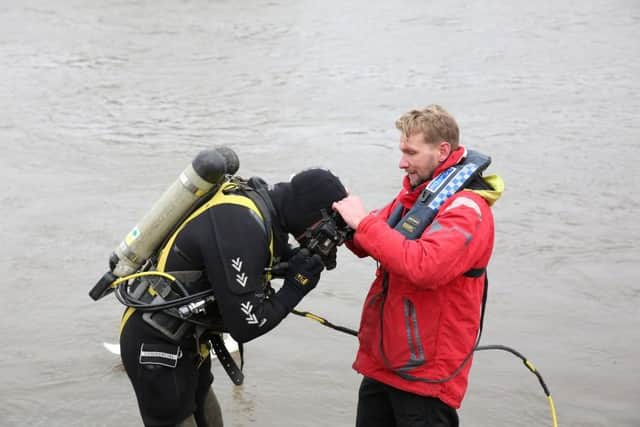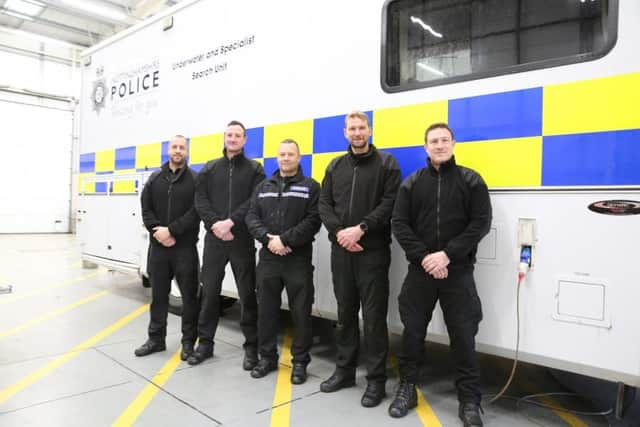Nottinghamshire police reveal ‘day in the life’ of a police officer in the Underwater Search Unit
and live on Freeview channel 276
Jumping into icy water at a moment’s notice and finding discarded weapons with almost zero visibility may sound like the job of a hero in an action movie, but it is exactly what one specialist police team are trained to do to save lives and keep people safe.
The Underwater Search Unit, which consists of ten highly skilled and specially trained officers, work across the force’s Operational Support department and are prepared to act immediately when they are called – with a wide range of high quality equipment and knowledge.
Advertisement
Advertisement
Work for the ‘dive’ team can vary, with the team working through a wide range of water and weather conditions, but their job often begins with a call from the control room.


PC James Patterson is a dive supervisor and has swam competitively for the Great Britain police swim team, winning a bronze medal in the 50m freestyle at the British Masters Championship in 2016. Having always had an interest in the water and being a keen swimmer, he made the move to the team 14 years ago, progressing to be a dive supervisor two years ago.
He said: “We could be called at the drop of a hat, no matter whether it’s icy or tropical conditions, to dive into various waters and, ultimately, save people’s lives. That is what we are specially trained to do and why it’s so important we keep up this training so, no matter what, we can be there.
“I think a lot of people associate us with recovering people’s loved ones from the water, and that is a hugely significant part of our role. We are also called for a number of other reasons, such as if an object, weapon, or items of clothing believed to have been involved in a crime has been thrown into the water.
Advertisement
Advertisement
“When we get a call and there is a need for deployment, we have to bring at least half the team out so ensure we can safely put one diver in the water.”


As well as during a dedicated ‘dive team’ call out, the team’s training has proven to save lives outside of this as well. Whilst PC Patterson was assisting with patrols at a Nottingham Forest football match in 2017, a man was seen to have gone into the River Trent and became unconscious.
His quick thinking, with help from officers, saw a tremendous effort where PC Patterson, attached to a life ring and 40m throw line, swam out across the river and saved the man.
He added: “Having been on the team for a while, I had played this kind of scenario out in my head and how I would react to it.
Advertisement
Advertisement
“When we were told he was breathing again, it was overwhelming, and it just goes to show why we do our job. We all have that same ethos as a team that, no matter the circumstances, we will be there and we will help.
“This goes for our call-outs as well. As we all work across other teams throughout the force, it’s not unusual to get a call a call outside our shifts or when we’re at home. It is then down to us to get a team together to go to the scene of the incident that has been called in.
“I think this is where we are really unique as a team. When we get that call, it could be the case that someone has gone into the water and their loved ones are on the bank or riverside waiting for help to arrive. The team are driven by that want to help and our morals to act as quick as we can, even when we’ve already clocked off for the day. If we aren’t there to help, no one is.”
Once they’re at the site, the team start preparing the equipment at the riverside and getting into the kit, whilst the dive supervisor prepares all the necessary paperwork, conducts checks and makes the necessary phone calls, including to the local authorities and the waterways.
Advertisement
Advertisement
Health and safety is at the forefront of a police diver’s role, and there are a number of courses that aspiring police divers have to take. This begins with an eight-week course in commercial diving, run by the Health and Safety Executive, and they are required to take a refresher course every four to five years.
After eight to ten years’ service, officers can then go on another three-week course to become a police diver.
Dive supervisor PC Steve Craner said: “Police diving is regulated by the health and safety executive so there are very stringent checks and procedures we have to go through.
“One of those is speaking with a dive contractor who we talk through all of the safety precautions with and make sure everything is in place. They then authorise us to dive based on those rules and regulations.
Advertisement
Advertisement
“This is really important as there’s often that want to get to work immediately, especially when someone’s loved one has gone in to the water and they’re waiting on the bank. Having that person who is away really helps us have that extra reassurance that it is in fact safe to put a diver in to the water.
“Once all this is covered, we then draw up a diving plan where we discuss how we’re going to perform the dive, the depths that the diver is going to go down to, how they’re going to stay at those depths and then recover themselves back to the surface.
“There’s always one diver and one standby diver in case they get in to any trouble, as well as attendants for both and a supervisor. We also have risk assessments and casualty evacuation plans in place in case anything happens on the dive site. We also hve to make a list of all the kit and check that it is in good working order and has been checked prior to the dive.”
Whilst these checks are being conducted, the rest of the team begin setting up on the bank, and once all the necessary approvals have come through, the team are briefed and the two nominated divers will get into their kits.
Advertisement
Advertisement
PC Patterson added: “Once the divers are all geared up, we get them into the water and immediately check that the dry suit they’re wearing doesn’t leak. We then get them fully under the water and test the communications kit, which allows the diver to hear us through an earpiece in their masks and also to talk back to us.
“Should this fail, we use the ‘lifeline’ method. This is where we use the air lines, which are attached to the diver, to communicate through a series of ‘pulls and bells’. Through training we learn what these all mean – it does take a bit of getting used to but you quickly learn to cue what they all mean.”
The diver is then instructed to go out and begin their search. In the water, objects either float on top or sink to the bottom, and depending on what they are searching for, officers will be taking part in one of two different search types.
“Objects are either buoyant or they’re not, so divers will either be searching at the bottom of the water or we’ll be doing a boat search on top, where one will be going upstream and one will be going downstream,” PC Patterson explained.
Advertisement
Advertisement
At the end of the dive, all the kit is loaded back on to the lorry and when they get back to base, the clean-up operation begins.
Once the kit is clean and back on the lorry, the team finalise any paperwork and are ready for any calls that might come in.
PC Patterson said: “Our role puts a lot of emphasis on getting safety elements right and it is so important as we never know what we might come across or the type of water we could be in. This could be rivers, lakes or even ponds, which we’ve searched before.
“However, it is such a rewarding role and knowing you can use your specialisms to help by recovering someone’s loved one, or an item that’s critical to helping an investigation, is definitely something that the whole team will say keeps them coming back for more.
“It just goes to show the myriad of opportunities that are available in policing and that there is something for everyone.”
To find out more about becoming a police officer, click here.

